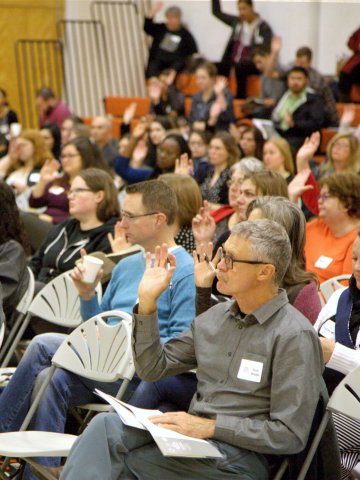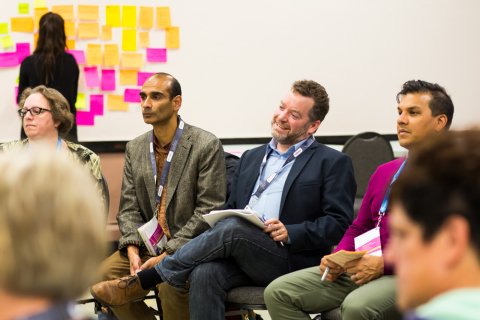 This commentary addresses key concepts to consider for the future of community development. This is not an academic paper, and is primarily based on just over a half a century of life experience, and 25 years of work experience with communities, diverse populations, programs, policy, and networks primarily in Oregon, United States of America (USA), as well as the Western U.S., nationally, and to some degree, internationally. I have worked for local government, a council of governments (COG), a combined community action program (CAP) and community development corporation (CDC), and a non-profit organization serving rural communities through training, technical assistance, and financing, primarily for small water and wastewater projects, and economic development—celebrating my 20 year anniversary! I have also led an advocacy team and have successfully advocated for community and economic development programs, housing programs, and water and wastewater infrastructure programs. To address the question, “what is the future of community development?”, one must consider that “community development” is about connecting people, primarily–and further connecting people with knowledge, skills, resources, to develop capacity (capability) to move forward with initiatives, activities, and projects to strengthen communities.
This commentary addresses key concepts to consider for the future of community development. This is not an academic paper, and is primarily based on just over a half a century of life experience, and 25 years of work experience with communities, diverse populations, programs, policy, and networks primarily in Oregon, United States of America (USA), as well as the Western U.S., nationally, and to some degree, internationally. I have worked for local government, a council of governments (COG), a combined community action program (CAP) and community development corporation (CDC), and a non-profit organization serving rural communities through training, technical assistance, and financing, primarily for small water and wastewater projects, and economic development—celebrating my 20 year anniversary! I have also led an advocacy team and have successfully advocated for community and economic development programs, housing programs, and water and wastewater infrastructure programs. To address the question, “what is the future of community development?”, one must consider that “community development” is about connecting people, primarily–and further connecting people with knowledge, skills, resources, to develop capacity (capability) to move forward with initiatives, activities, and projects to strengthen communities.
Recently, the International Association of Community Development (IACD) adopted a definition of community development
(a bold endeavor): community development is a practice-based profession and an academic discipline that promotes participative democracy, sustainable development, rights, equality, economic opportunity and social justice, through the organization, education and empowerment of people within their communities, whether these be of locality, identity or interest, in urban and rural settings. The Community Development Society (CDS) adopted this definition following the CDS IACD Annual International Conference, Sustaining Community Change; Building Local Capacity to Sustain Community Development Initiatives in Bloomington, Minnesota, July, 2016. The National Association of Community Development Extension Professionals (NACDEP) adopted the definition in conjunction with the CDS NACDEP Conference, Big Skies, Bold Partnerships; Moving Mountains Together in Big Sky, Montana, June, 2017. These events brought together hundreds of people involved with community development from around the world, and particularly the U.S., to share research, projects, programs, resources, challenges, and success stories to further the field of community development, and partnership—the basis for connecting people. So the future of community development must involve “partnership”. Partnerships help bridge divisions between people, groups, communities, organizations, agencies, business, etc. Partnerships are relationships based on understanding and agreements around principles, purposes, goals, processes, mutual benefits. Partnerships break down the silos we fall into with programs such that we can collaborate on initiatives, activities, and projects for greater impact in communities.
The United Nations Sustainable Development Goals (SDGs)
The SDGs adopted in 2016 also offer a plethora of areas to focus on for the future of community development—I believe “Goal 6, Clean Water and Sanitation” is the most important. Why? Because human beings cannot exist without water. In fact, water is so important that we cannot have life on earth without water. Water is arguably the most important element (air also) to survive. Since life is the foundation for human beings, and human beings make up communities, water must be in the top considerations for the future of community development. So, while we are it, let’s talk about “climate change”. Whether or not you believe in “global warming”, let’s look at the world. Just this year, and last year, and the last few years, there have been larger storms, with greater intensity, with more frequency. The National Oceanic Atmospheric Administration (NOAA) routinely posts updates about records for the “hottest year” on record, the warmest spring, the coldest winter, which seem to be more and more common. There is no doubt that what we have seen this past summer into fall in the first part of hurricane season alone, the impacts of storms—and the need to be prepared for emergencies, and protection of water and health. Fires in northern California are the result of immediate adverse environmental conditions due to (dry conditions and wind) and several years of drought— it’s all about water.
Health
Health is another critical area for the future of community development, because health, like water (and food) is vital for biological survival. Without water, food, and health, all of which are inter-related of course, we die. Air too. Health care, access to health care, and preventive approaches to curbing risks, and costs, are key basic elements which we need to get a handle on for the future. Some may say we are in a crisis in the United States—some folks think our health care system is a disaster, others are making proposals which many think are disasters—bottom line, we need to expand the access to health care, particularly for people who cannot afford it, as these populations are most at risk for health problems—the cycle of poverty keeps people unstable. It becomes difficult to live in a house, which makes it difficult to find and keep a job, and buy food, and feed kids, and have time for family, and so on. Access to care to maintain decent health cornerstone for any civil society.
Housing
Homelessness in my city, Portland, Oregon, and in Oregon as a state, is becoming a greater, more noticeable,
problem. There was an area along a creek recently “swept” by the city which yielded pounds of human waste, needles, and garbage throughout the area, and many of the people who “lived” there can be found along a neighborhood street corner, in a vehicle parked in a street, under the highway bridge, along the railroad tracks, and in neighborhoods throughout the city.
Meanwhile, home prices are sky rocketing making homeownership more difficult, and most of the new housing is higher end condominium or town houses, rather than single family, or affordable housing. Portland is filling in, and people are finding it more difficult to find affordable rental, or homeownership, housing. At the League of Oregon Cities (LOC) Annual Conference in Portland, nearly every representative from every city I spoke with about needs mentioned “housing”. For a country where poverty is so severe, and resources so scarce, basic shelter may not even be possible. Humans need covered places for safety, warmth, and stability—even nomadic people had camps with shelter. Without it, human life cannot be stable.
Arts and Culture
People need to belong. We are social creatures who identify with others through groups, behaviors, common meaning through values, expression, symbols, language, music, customs, and art. I hesitate to even say what art “is”, given the wide range of interpretation (isn’t that the point?). I will suggest the ability to create leads to everything we develop. Everything we have ever invented comes from creativity! Economies come from creativity, solving problems or addressing needs—the
foundation for entrepreneurship—comes from creativity, products and services come from creativity, money comes from creativity, and the idea to do something comes from creativity.
People identify with each other through culture, and art, as intrinsic elements of our being. The CDS NACDEP Conference in Big Sky, Montana featured leadership through lyricism; hip hop culture and leadership in community development including two inspirational hip hop artists and teachers of culture about how expression of challenges in culture through art (i.e. rapping like
poetry), can be a positive outlet for troubled youth. Arts and culture are often overlooked in communities, but they are the foundation of values in defining community. At the same time, the future of community development must embrace the challenge of diversity in culture, to foster acknowledgement and respect of differences, and to ensure community development professionals gain some degree of “cultural competence”—a significant challenge in our primarily English speaking society.
Technology
Where we have been the past 25 years is an indication of how far we may go in the next 20 years technologically. We did not have the internet as a common medium for communication, we did not have wireless technology widely used, and we did not have smart phones. I remember having “Star Trek” toys as a kid—a communicator which reminds of the “clam” cell phone, and a “tricoder” which reminds me of google at the press of button, or Siri as Spock says “computer, how far is it to the Fred Meyer grocery store on SE Glisan St.?” For those of you who know what I am talking about great, for those who do not, just remember there was an original Star Trek which existed before computers. Some of these items which have actually manifested in similar forms in our modern world. Still we do not beam down to planets and back to space ships, but who can really say what the next 25 years will bring? More social networking, more integrated audio-visual systems, more reality simulation experiences, more holographic and voice activated systems, auto-driving cars (?), new energy systems (?), drone monitoring (?). The possibilities seem literally endless. For a technophobe in the 1980’s, I am encouraged to see people still interacting, as we will always be social creatures. While I also see problems with people looking at screens more and more throughout the day, particularly children, with alienation, attention deficit, and potential impacts on social skills, I also see positive benefits of embracing technology, social media, and information systems. One thing is for sure, the future of community development needs to embrace, and even enhance, technology systems for greater connectivity, information sharing, and improving processes in delivering services—all of which is possible!
Well Being
The idea of well-being is that we have a positive mental state, hope, and faith. The CDS Annual International Conference in recent years has featured several sessions on individual, social, and community well-being. This is perhaps viewed as the “advanced” stage of community development, as one could consider Maslow’s hierarchy of needs—several of which are represented in key issues to consider for the future of community development–safety, shelter, belonging, and self-esteem (double check to make I got them). I have read about how positive thinking impacts health (positively), and negative thinking affects health negatively. Teams, or groups, which practice positive mental attitude are motivated to achieve—I remember playing soccer and Positive, Mental Attitude (PMA) was our mantra and meditation. We envisioned making it to the state championship, and did. So we lost, and even in that, we lost with grace and celebrated our magical journey. In order for communities to live well, people need to think well, have hope, and care. What else are we here for? Well that is perhaps another question for another commentary. My intention is to address key issues I believe are important for the future of community development—some, but not all. I hope this helps you consider what the future of community development will be for you, and your communities.
I leave you with some more to consider in my CDS Presidential address at the CDS NACDEP Conference in Big Sky, Montana, June 13th, 2017 in community development.
Now is the time for community development
Why? Now more than ever we need solution oriented thinking to address the challenges of our time including fear of difference which manifests on multiple levels; racism, sexism, religious intolerance, political conflict, and economic disparity. We need people like you, like us, who can help bridge and heal divisions between each other, within communities, states, nations, and around the world. As community developers we engage others in discussion, promote collaborative decision-making, and develop a sense of community, not separation. CDS principles of good practice represent values which can help in this process. Community development models and approaches can help frame how we approach our work, and each other, including the community capitals framework and values of wealth. Culture and arts can also play a vital role in attracting youth, empowering people who are marginalized, and promoting expression of life experience to enrich our communities, and economies as we have learned at this conference. I will discuss how these three elements combined can help guide our path to creating a better world for each other and communities.
CDS Principles of Good Practice
- Promote active and representative participation toward enabling all community members to meaningfully influence the decisions that affect their lives. This is the foundation for democratic process and now more than ever we need to engage people in civil, constructive, and productive dialogue in a politically charged climate of polarity, division, and extremism.
- Engage community members in learning about and understanding community issues, and the economic, social, environmental, political, psychological, and other impacts associated with alternative courses of action. Communities are complex, and cannot be defined by one characteristic, or program, or single discipline. Now more than ever human beings need connection and that is what community development promotes: connection, not disconnection.
- Incorporate the diverse interests and cultures of the community in the community development process; and disengage from support of any effort that is likely to adversely affect the disadvantaged members of a community. Now more than ever we need acknowledgement, understanding, and appreciation of people’s differences. People cannot appreciate differences if they do not understand differences, and misunderstanding can lead to conflict and violence as we see more and more every day. We live in a world which must embrace diversity, and new leadership of CDS is taking initiative to promote diversity.
- Work actively to enhance the leadership capacity of community members, leaders, and groups within the community. CDS annual international conferences feature sessions on leadership, and now more than ever we need real leaders who can inspire others, share knowledge to create “legacy” as we heard at our conference in Big Sky to leave behind a positive impact on future life. Leadership is not just about elected officials, it is about positive action.
- Be open to using the full range of action strategies to work toward the long-term sustainability and well-being of the community. We are living in a world of incredible change.
Our world views are being challenged more than ever and the reality that things are not how we thought is evident day after day. Community development is about adapting to change with various models, tools, and approaches in working with communities. No one community is exactly the same as another, and that is why utilizing a host of strategies is important. Many of the CDS principles of good practice complement the Community Capitals Framework/Values of Wealth models of community development, which embrace multiple elements of community.
- Intellectual
- Individual
- Cultural
- Social
- Environmental
- Physical
- Financial
- Political
I will now leave you with some Lyrical Leadership as “Community Development Meets Hip Hop”:
Now is the time for community development
Peace, love, and unity need to become more relevant Hip Hop we heard is here to stay
Like it or not is what Divine Carama had to say Indeed, we have Supaman powers to save the day
Put your hands in the air and just say “hey!”
I embrace this art as a part of life Representing struggle and dealing with strife
We need positive thinking, solution oriented minds
We need more caring and finding ways to be kind
Now I am not perfect, but I have something to say
I am President of CDS as long as today
Here in Big Sky, Montana, we’ve come a long way
But we must move on and cannot stay
So please consider these words
As expressions not so absurd
We are here to change the world and make a better place
Share in community and the best of the human race
So what is the message of my Presidential address?
Now is the time for CDS!
I thank you all and feel so blessed.

Peace Out
Chris Marko
CDS President 2016 – 2017
*The opinions expressed in blog posts are those of the author(s) and do not necessarily reflect the position of CCEDNet









 CCEDNet members and partners interested in hosting EconoUs2020 are invited to submit an expression of interest
CCEDNet members and partners interested in hosting EconoUs2020 are invited to submit an expression of interest



 RIPESS, the Intercontinental Network for the Promotion of the Social Solidarity Economy, recently asked the following 5 questions to Béatrice Alain, recently appointed Director of the
RIPESS, the Intercontinental Network for the Promotion of the Social Solidarity Economy, recently asked the following 5 questions to Béatrice Alain, recently appointed Director of the  Béatrice Alain is the Executive Director at the
Béatrice Alain is the Executive Director at the  “Social enterprises are found in every Ontario constituency, including yours, and are widely supported by all Ontario political parties. Ontario has had a social enterprise strategy for a few years but we believe that there is much more we can do to make Ontario a true global hub forsocial enterprises – a province with the right conditions for social enterprises to emerge, develop, grow and create more jobs.”
“Social enterprises are found in every Ontario constituency, including yours, and are widely supported by all Ontario political parties. Ontario has had a social enterprise strategy for a few years but we believe that there is much more we can do to make Ontario a true global hub forsocial enterprises – a province with the right conditions for social enterprises to emerge, develop, grow and create more jobs.”



 This commentary addresses key concepts to consider for the future of community development. This is not an academic paper, and is primarily based on just over a half a century of life experience, and 25 years of work experience with communities, diverse populations, programs, policy, and networks primarily in Oregon, United States of America (USA), as well as the Western U.S., nationally, and to some degree, internationally. I have worked for local government, a council of governments (COG), a combined community action program (CAP) and community development corporation (CDC), and a non-profit organization serving rural communities through training, technical assistance, and financing, primarily for small water and wastewater projects, and economic development—celebrating my 20 year anniversary! I have also led an advocacy team and have successfully advocated for community and economic development programs, housing programs, and water and wastewater infrastructure programs. To address the question, “what is the future of community development?”, one must consider that “community development” is about connecting people, primarily–and further connecting people with knowledge, skills, resources, to develop capacity (capability) to move forward with initiatives, activities, and projects to strengthen communities.
This commentary addresses key concepts to consider for the future of community development. This is not an academic paper, and is primarily based on just over a half a century of life experience, and 25 years of work experience with communities, diverse populations, programs, policy, and networks primarily in Oregon, United States of America (USA), as well as the Western U.S., nationally, and to some degree, internationally. I have worked for local government, a council of governments (COG), a combined community action program (CAP) and community development corporation (CDC), and a non-profit organization serving rural communities through training, technical assistance, and financing, primarily for small water and wastewater projects, and economic development—celebrating my 20 year anniversary! I have also led an advocacy team and have successfully advocated for community and economic development programs, housing programs, and water and wastewater infrastructure programs. To address the question, “what is the future of community development?”, one must consider that “community development” is about connecting people, primarily–and further connecting people with knowledge, skills, resources, to develop capacity (capability) to move forward with initiatives, activities, and projects to strengthen communities.
 Alberta’s new Community Economic Development Corporation (CEDC) tax credit program will offer a 30 per cent tax credit to Albertans who invest in registered CEDCs. In turn, the corporations will provide capital to Alberta small businesses and co-operatives that focus on social improvement or rural economic development.
Alberta’s new Community Economic Development Corporation (CEDC) tax credit program will offer a 30 per cent tax credit to Albertans who invest in registered CEDCs. In turn, the corporations will provide capital to Alberta small businesses and co-operatives that focus on social improvement or rural economic development.